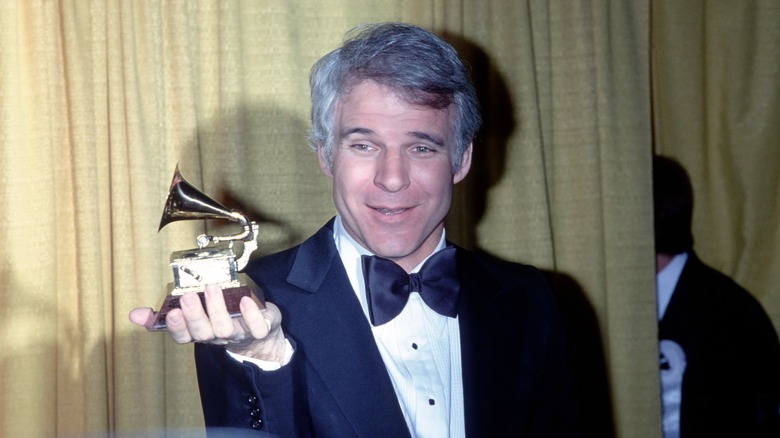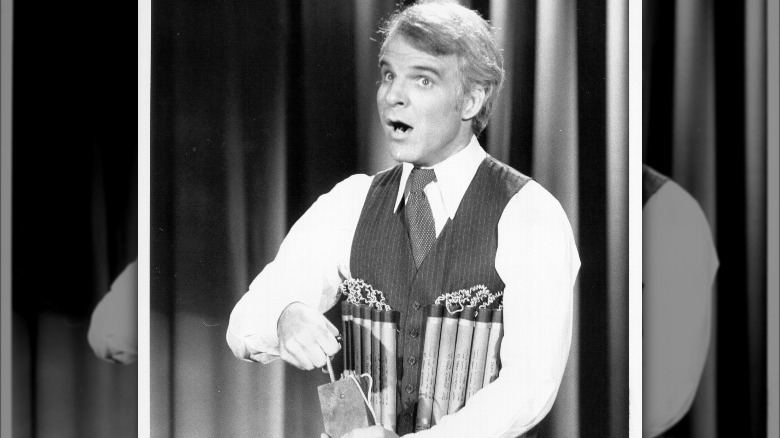A Resurfaced Steve Martin Sketch Has The Internet Seeing Red
A former "Saturday Night Live" cast member who has achieved commercial success, Steve Martin is known as a genius comedian, banjo player, and member of the "SNL" 5-timers host club. However, a video of Martin's 1978 King Tut "SNL" sketch, based on the then-touring exhibition "The Treasures of Tutankhamun," is picking up speed on Twitter as users question the comedian's cultural impact in the early years of his career.
In 2017, the sketch gained attention in the news when students at Reed College in Portland, Oregon, demonstrated their outrage at a Humanities professor who showed the video in a class, per The Atlantic. The course, a required seminar for all first-years called Introduction to Western Humanities, claims to support a Socratic learning style and intellectual debate, per Professor Peter Steinberger's 2011 write-up for Reed Magazine. He describes its content and names that the seminar's purpose is "to engage in original, open-ended, critical inquiry."
However, its examination of Greek, Roman, Mesopotamian, Egyptian, and Persian regions and cultures includes texts that student group Reedies Against Racism described as perpetuating harmful Eurocentric depictions of ancient civilizations. For example, one student representative told The Atlantic, "The gold face of the saxophone dancer leaving its tomb is an exhibition of blackface."
Though it's unclear how Steven Martin himself responded to the backlash back in 2017 and now on Twitter, the sketch's satirical value is once again being weighed against its subject matter. For today's audience, the sketch's negative impact is worsened by Martin's position as a white man dressed as an Egyptian king who was a person of color.
The SNL sketch was meant to critique the consumption of ancient Egyptian culture
Steve Martin's original opening monologue for the "King Tut" sketch on "Saturday Night Live" has been cut from many of the videos floating around Twitter, according to user gallandguile. So they posted the sketch in its entirety with the caption calling the cut "a criminal offense that borders on libel. The whole thing is a punchline."
The video begins with Martin, dressed as King Tut, saying, "I'd like to talk seriously just for a moment. One of the great art exhibits ever to tour the United States is 'The Treasures of Tutankhamun,' or King Tut. But I think it is a national disgrace the way we have commercialized it with trinkets and toys, t-shirts and posters." He goes on to say that he retreated to the woods and wrote a song, explaining, "I tried to use the ancient modalities and melodies."
Audience members can be heard laughing throughout his monologue, apparently anticipating an ironic twist. And Martin delivered — the solemn intro was followed by the sketch's punchline, an elaborate set featuring Egyptian imagery and backup dancers dressed in the same costume style as Martin.
Martin's performance following his monologue consisted of a silly song about how King Tut wouldn't believe how popular the exhibit was and dance moves meant to be a send-up of Egyptian culture. However, what was meant to be an absurd take on the commercialization of Egyptian culture ultimately perpetuated that which it critiqued: the commodification, disrespect, and caricaturization of an ancient civilization.
Twitter is divided over the King Tut sketch's impact
Multiple perspectives on Steve Martin's 1978 "Saturday Night Live" sketch have come to light through the dialogue happening on Twitter, prompting users to consider whether millennials are truly the show's target audience. One user wrote that it was difficult to defend the sketch when it was taken out of context. "I was very alive in the 1970s and remember the King Tut exhibit touring the US, the national obsession and all the commercialization of it. Martin is making fun of that and without the intro, the cultural context of what was happening in the US at the time is lost."
User RPHutch1975 wrote, "I won't be canceling Steve Martin over a ['70s] comedy bit that was culturally relevant and an incisive take on commercialism of something that was relevant at the time." They also pointed out the futility of directing anger toward the past instead of the injustices being perpetuated today.
Some Twitter users didn't see tweets that conveyed disappointment over the sketch, but as user themantizshrimp pointed out, "Scrolling doesn't really reveal all of Twitter. Twitter algorithm decides which tweets you see. I imagine there's outrage. For a lot of people the context isn't going to excuse the actual skit."
Other users simply described the sketch as dated and unappealing within today's cultural context and understanding of appropriative and offensive content.


